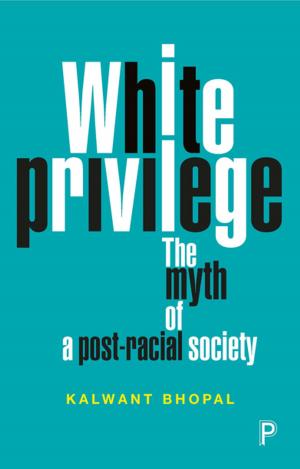Embodied research in migration studies
Using creative and participatory approaches
Nonfiction, Social & Cultural Studies, Social Science, Sociology| Author: | Vacchelli, Elena | ISBN: | 9781447339083 |
| Publisher: | Policy Press | Publication: | July 4, 2018 |
| Imprint: | Policy Press | Language: | English |
| Author: | Vacchelli, Elena |
| ISBN: | 9781447339083 |
| Publisher: | Policy Press |
| Publication: | July 4, 2018 |
| Imprint: | Policy Press |
| Language: | English |
The definition of data in qualitative research is expanding. This book highlights the value of embodiment as a qualitative research tool and outlines what it means to do embodied research at various points of the research process. It shows how using this non-invasive approach with vulnerable research participants, such as migrant, refugee and asylum seeking women can help service users or research participants to be involved in the co- production of services and in participatory research. Drawing on both feminist and post-colonial theory, the author uses her own research with migrant women in London, focusing specifically on collage making and digital storytelling, whilst also considering other potential tools for practicing embodied research such as yoga, personal diaries, dance and mindfulness. Situating the concept of ‘embodiment’ on the map of research methodologies, the book combines theoretical groundwork with actual examples of application to think pragmatically about intersectionality through embodiment.
The definition of data in qualitative research is expanding. This book highlights the value of embodiment as a qualitative research tool and outlines what it means to do embodied research at various points of the research process. It shows how using this non-invasive approach with vulnerable research participants, such as migrant, refugee and asylum seeking women can help service users or research participants to be involved in the co- production of services and in participatory research. Drawing on both feminist and post-colonial theory, the author uses her own research with migrant women in London, focusing specifically on collage making and digital storytelling, whilst also considering other potential tools for practicing embodied research such as yoga, personal diaries, dance and mindfulness. Situating the concept of ‘embodiment’ on the map of research methodologies, the book combines theoretical groundwork with actual examples of application to think pragmatically about intersectionality through embodiment.















